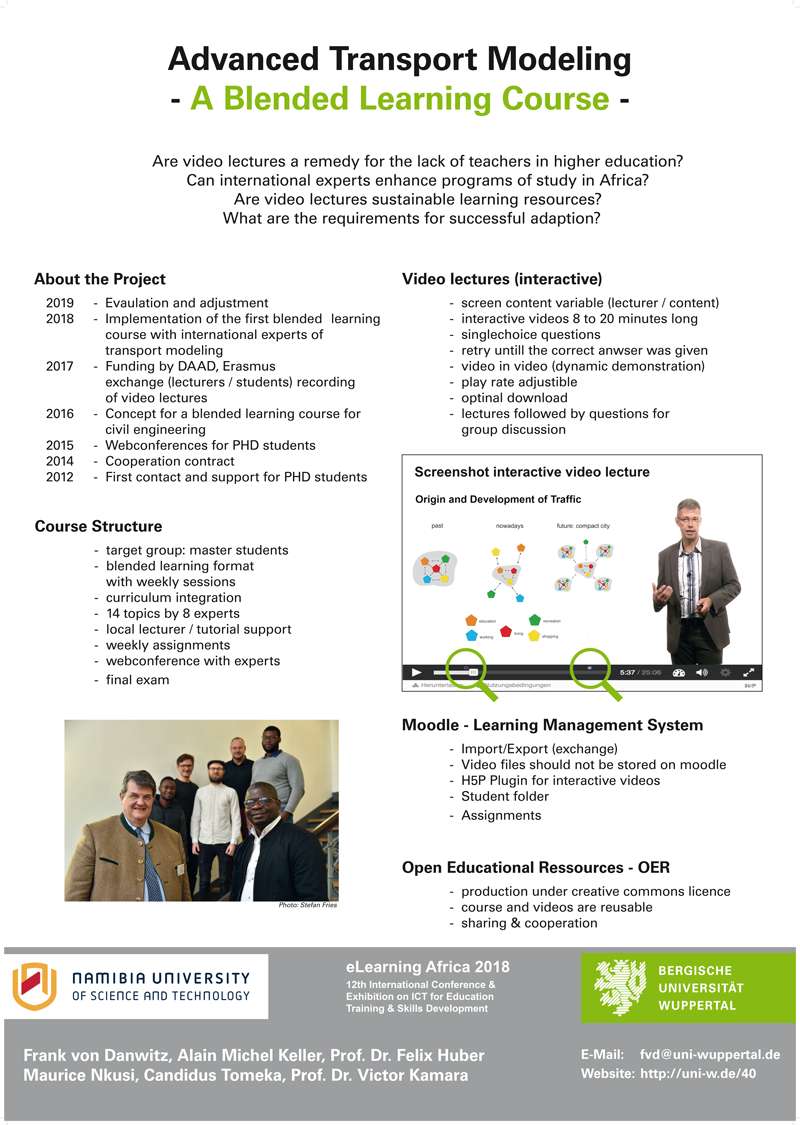Conference eLearning Africa 2018 - Kigali, Rwanda
Frank von Danwitz, Alain Michel Keller & Felix Huber
University of Wuppertal, Germany
Maurice Nkusi & Candidus Tomeka & Victor Kamara,
Namibian University of Science and Technology, Namibia
Advanced Transport Modeling - A Blended Learning Course
Since 2014 the University of Wuppertal,Germany (BUW) and the Namibian University of Science and Technology (NUST) have been cooperating in the field of civil engineering. In the latest project, a blended learning course for transport modeling was set up by a team around Prof. Dr. Felix Huber. The master course well adapted for the curriculum of both universities. The course syllabus has 14 topics, created by 8 different international experts for transport modeling. Each session has multiple interactive video lectures varying in length from 8 to 20 minutes. This means, that the course experts are not physically present, but instead a local lecturer or tutors work with the students in weekly sessions. The students can work with the interactive video lectures individually and in groups. The videos pause after important content of teaching and only continue after the students gives the correct answer to a few pop up questions. The students also have to submit weekly written assignments concerning the video lectures. For each session the course also provides videos to initiate group discussions. For some topics a web conference is available, so deeper matter issues can be discussed with the expert in person. At the end of the course, there is a final exam. The final grade is comprised of the weekly assignments (40%) and the final exam (60%). The complete course is run via the local learning management system moodle, to provide the best performance.
The video quality is on a high level. All recordings were made in a studio at the University of Wuppertal. The screen format allows to see the lecturer (⅓) and the content (⅔) side by side. To make the videos interactive, we used the H5P plugin for moodle. In H5P you can work with different kinds of questions (e.g. single choice) and annotations. All the videos in the course are open educational resources (OER). This is a fundamental aspect for us as we believe in the free access to information. However, the production of the video lectures as OER took time and effort. The graphics, pictures and animations used in the videos, needed to be under a creative commons license. Therefore we created or bought all the media used in the videos.
The course Advanced Transport Modeling is running for the first time from July to October 2018. We are evaluating the course while running and afterwards to improve it for the coming semesters. We are looking forward to produce other courses with video lectures and want to share our content and cooperate with other universities.
Our projects are funded by different sponsors. The DAAD (German Academic Exchange Service). paid for the exchange of students, staff and lecturers. This was especially helpful, to run a beta test in which we reflected on the content with students and worked on the interactivity of the video lectures. We also recorded student questions that are used to initiate discussions in the weekly sessions. Most importantly, the DAAD grant allowed us to implement the course on the local moodle installation at NUST, train the local lecturer and tutors and exchange ideas for further cooperations between the e-learning units at NUST and BUW.
Blended learning courses bear great educational opportunities. For example they allow you to work with the inverted the classroom concept or you can incorporate experts from different countries without paying extensive traveling fees. Our course can be easily adjusted to meet the requirements at your university. We invite you to meet us at the poster presentation of eLearning Africa. Let’s discuss: Are video lectures a remedy for the lack of teachers in higher education? Can international experts enhance programs of study in Africa? What are the requirements for successful adaption? Are video lectures sustainable learning resources?
References
Project website: uni-w.de/40

